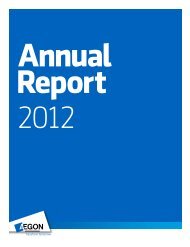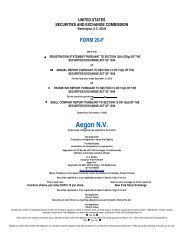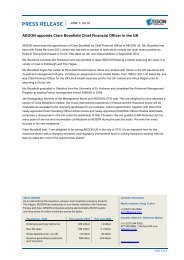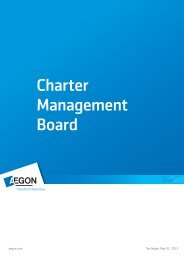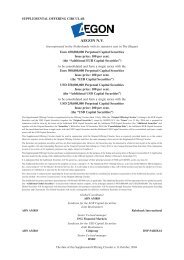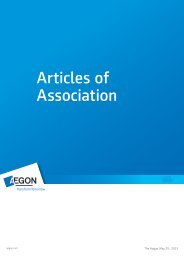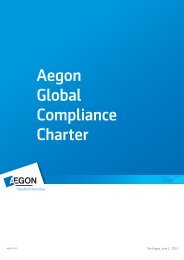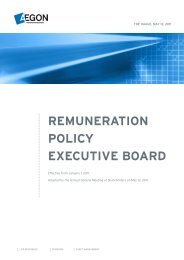Prospectus supplement US007924AH66 - Aegon
Prospectus supplement US007924AH66 - Aegon
Prospectus supplement US007924AH66 - Aegon
You also want an ePaper? Increase the reach of your titles
YUMPU automatically turns print PDFs into web optimized ePapers that Google loves.
ates than ordinary income for taxpayers who are individuals, trusts or estates that have held the<br />
common shares for more than one year) and capital losses (the deductibility of which is subject to<br />
limitations).<br />
If a U.S. holder receives foreign currency upon a sale or exchange of common shares, gain or loss,<br />
if any, recognized on the subsequent sale, conversion or disposition of such foreign currency will be<br />
ordinary income or loss, and will generally be income or loss from sources within the United States for<br />
foreign tax credit limitation purposes. However, if such foreign currency is converted into U.S. dollars<br />
on the date received by the U.S. holder, the U.S. holder generally should not be required to recognize<br />
any gain or loss on such conversion.<br />
Redemption of Common Shares. The redemption of common shares by AEGON N.V. will be<br />
treated as a sale of the redeemed shares by the U.S. holder (which is taxable as described above under<br />
‘‘Sale or Other Disposition of Shares’’) or, in certain circumstances, as a distribution to the U.S. holder<br />
(which is taxable as described above under ‘‘Distributions’’).<br />
Passive Foreign Investment Company Considerations. A corporation organized outside the United<br />
States generally will be classified as a PFIC for U.S. federal income tax purposes in any taxable year in<br />
which either: (1) at least 75% of its gross income is passive income, or (2) on average at least 50% of<br />
the gross value of its assets is attributable to assets that produce passive income or are held for the<br />
production of passive income. In arriving at this calculation, AEGON N.V. must also include a pro rata<br />
portion of the income and assets of each corporation in which it owns, directly or indirectly, at least a<br />
25% interest. Passive income for this purpose generally includes dividends, interest, royalties, rents and<br />
gains from commodities and securities transactions, but excludes any income derived in the active<br />
conduct of an insurance business by a corporation which is predominantly engaged in an insurance<br />
business. Based on AEGON N.V.’s estimated gross income, the average value of AEGON N.V.’s gross<br />
assets and the nature of AEGON N.V.’s active insurance business, AEGON N.V. does not believe that<br />
it will be classified as a PFIC in the current taxable year or for the foreseeable future. AEGON N.V.’s<br />
status in any taxable year will depend on its assets and activities in each year and because this is a<br />
factual determination made annually at the end of each taxable year, there can be no assurance that<br />
AEGON N.V. will not be considered a PFIC for any future taxable year. If AEGON N.V. were treated<br />
as a PFIC in any year during which a U.S. holder owns common shares, certain adverse tax<br />
consequences could apply. Investors should consult their own tax advisors with respect to any PFIC<br />
considerations.<br />
Debt Securities of AEGON N.V. and AFC<br />
Interest. Interest paid on the debt securities, other than interest on a discount note that is not<br />
qualified stated interest (each as defined below under ‘‘Original Issue Discount’’), will be taxable to a<br />
U.S. holder as ordinary interest income at the time it is received or accrued, depending on the U.S.<br />
holder’s method of accounting for U.S. federal income tax purposes.<br />
A U.S. holder utilizing the cash method of accounting for U.S. federal income tax purposes that<br />
receives an interest payment denominated in a foreign currency will be required to include in income<br />
the U.S. dollar value of that interest payment, based on the exchange rate in effect on the date of<br />
receipt, regardless of whether the payment is in fact converted into U.S. dollars.<br />
If interest on a debt security is payable in a foreign currency, an accrual basis U.S. holder is<br />
required to include in income the U.S. dollar value of the amount of interest income accrued on a debt<br />
security during the accrual period. An accrual basis U.S. holder may determine the amount of the<br />
interest income to be recognized in accordance with either of two methods. Under the first accrual<br />
method, the amount of income accrued will be based on the average exchange rate in effect during the<br />
interest accrual period or, with respect to an accrual period that spans two taxable years, the part of<br />
the period within the taxable year. Under the second accrual method, the U.S. holder may elect to<br />
38



